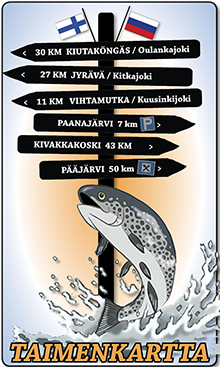Oulangan taimenhankkeen tutkijat Ilya Solomeshch (Petroskoin valtionyliopisto) ja Timo P. Karjalainen (Thule-instituutti/Oulun yliopisto) osallistuvat 9-13.6.2014 Joensuussa ja Pietarissa pidettävään kansainväliseen konferenssiin Association for Borderland Studies First World Conference. Heidän esitelmänsä aiheena ovat valtioiden rajoista piittaamattomat kalat (fish ignoring borders), jotka ovat otollinen esimerkkitapaus usean eri valtion yhteisten luonnonvarojen hallinnoinnin ja hoidon kehittämisessä.
Alla esitelmän englanninkielinen tiivistelmä:
FISH IGNORING THE BORDERS - TOWARDS SUSTAINABLE NATURAL RESOURCES GOVERNANCE IN CROSS-BORDER COOPERATION
Timo P. Karjalainen, Thule Institute / University of Oulu, Finland
Ilya Solomeshch, Petrozavodsk State University, Russia
ABSTRACT Migratory fish and their habitat in the Oulanka river system are shared by Finland and Russia, and therefore, successful sustainable management and utilization of these valuable fish resources can only be achieved through cross-border cooperation. Overfishing may threaten fish populations, biodiversity, nature tourism and the livelihoods of local people. Recreational services in the area are multifaceted and cater to many groups in addition to fishing tourists. According to the Red list of Finnish species (Ministry of Environment, 2010) the trout populations in Oulanka River are already classified as endangered. Without sustainable management the trout populations are subject to overfishing and may decline significantly.
In this paper, we first study how the trout populations of Oulanka River are valued on the Finnish and Russian side of the border. What are different meanings and social, cultural and economic valuations of trout in two different cultural and institutional contexts? Second, we study the patterns of reaction of various sectors to the cross-border joint management model in order to secure sustainable management of trout. We claim that in natural resource management in general and especially in cross-borderlands differences in social and cultural contexts and wider societal perspectives, such as how to support local livelihoods and wellbeing, are not taken into account in an appropriate and efficient way. At the end of the paper, we discuss these challenges of governance. How to move from the ideas of resource management to the wider perspective of governance?





